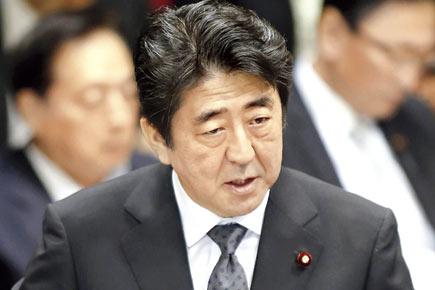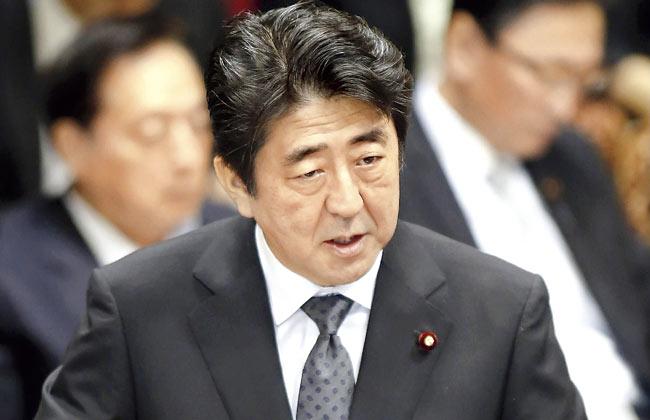In what could worry China, India and Japan Monday pledged to develop "closer and strategic partnership" as Prime Minister Narendra Modi declared on the third day of a path-breaking visit that relations with Tokyo were "the highest priority for my government"

Japanese Prime Minister Shinzo Abe
Tokyo: In what could worry China, India and Japan Monday pledged to develop 'closer and strategic partnership' as Prime Minister Narendra Modi declared on the third day of a path-breaking visit that relations with Tokyo were 'the highest priority for my government'.
ADVERTISEMENT

Japanese Prime Minister Shinzo Abe. Pic/AFP
India and Japan also decided to speed up the negotiations over civil nuclear cooperation, and work on an agreement to collaborate on military technologies.
"Today we have taken an important decision to elevate (our) relationship from Strategic and Global Partnership to a Special Strategic and Global Partnership," Modi said in the company of his Japanese counterpart Shinzo Abe after their summit meeting.
"This is not just a play of words but a decision that reflects the solemn responsibilities of our two governments and two countries," Modi added.
Abe agreed: "We have to fundamentally improve our ties in every field to elevate our relationship into a special strategic partnership."
Abe said he had fruitful exchange of ideas with Modi, that the two countries had agreed to enhance cooperation in maritime security, and that "security cooperation between India and Japan will deepen further".
Modi welcomed Japan's commitment to invest $35 billion in India over the next five years, and hailed Tokyo's decision to end sanctions on Indian entities.
"No country has done more for modernizing India's infrastructure than Japan," said Modi, who picked Japan for his first bilateral visit outside the Indian sub-continent after becoming prime minister in May.
India and Japan signed agreements in health, clean energy, women development and roads sector and a pact between Kyoto and Varanasi. Japan agreed to extend technical and financial support to the proposed bullet train project in India.
Monday was another hectic day for Modi, who flew into Kyoto -- Japan's former capital -- Saturday, to be received by Abe. He flew to the Japanese capital Sunday. On Monday, Modi called Abe "an old friend" and said his Japanese counterpart had shown "special love for India".
A 3,300-word Tokyo Declaration summed up the new warmth in India-Japan ties, with references to their convergent global interests, a new era of cooperation in military equipment and technology, shared interests in the security of maritime and cyber domains, as well as "closer and stronger strategic partnership".
And in what is bound to raise eyebrows in China, it said New Delhi and Tokyo "expressed satisfaction with progress in official level trilateral dialogue among India, Japan and the US and expressed the hope this would lead to concrete and demonstrable projects to advance their shared interests".
There was no reference to any other country in the Declaration. But Modi told Japanese business leaders in a separate address that the world was witnessing "expansionism" seen in the 18th century.
"Encroaching on a country, entering into sea somewhere, entering a country and occupying territory - this expansionism cannot do good to the humanity in the 21st century," he said.
Modi told the media that the two countries had agreed to tell their officials to work expeditiously to conclude negotiations at the earliest on a civil nuclear agreement.
Modi said Japan was among India's "closest and most reliable partners". He promised a fast-track channel for Japanese investors.
"We have to fundamentally improve our ties in every field to elevate our relationship into a special strategic partnership."
Modi said Japan will play an increasingly important role in India's economic transformation.
The Indian prime minister also said that the two countries intended to give a new thrust to their defence cooperation "given our shared interest in peace and stability and maritime security".
Modi and Abe decided to continue the annual summit meetings.
They affirmed the urgent need for comprehensive reforms of the UN Security Council, especially its expansion in both permanent and non-permanent categories, to make it more representative, legitimate, effective and responsive to the realities of the 21st century.
Modi returns to India Wednesday.
 Subscribe today by clicking the link and stay updated with the latest news!" Click here!
Subscribe today by clicking the link and stay updated with the latest news!" Click here!






